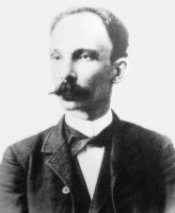Summary | Excerpt | Reviews | Beyond the Book | Read-Alikes | Genres & Themes | Author Bio

A Subtropical Delirium
by Mark KurlanskyThis article relates to Havana
Mark Kurlansky's Havana begins with this poetic snippet:
El corazón es un loco
Que no sabe de un color.
(The heart is a fool
that knows no color.)
The composer is the highly regarded José Martí, a significant figure in the pantheon of Latino writers, and more especially, in the small but distinguished group of Cuban revolutionaries. Born in Havana in 1853, Martí was a child prodigy whose career as a poet began in his teens. He was published before he turned 16. Even in his teens, his writing expressed his passionate belief that Cuba needed to gain independence and break from Spain, earning him a year in prison followed by exile in Spain.
 By 1875, with a law degree to his credit, Martí was able start a new life as a writer in Mexico, then Guatemala. Finally managing to return to his beloved Cuba in 1895 he was almost immediately exiled again because of his rebellious views, and wound up in New York City where he joined the Cuban Revolutionary Party. There, many of his radical ideas were crystallized in poetry and journalism and he gained the appellation "Apostle of Freedom." He raised money to gather a small group of military-minded followers who attempted to foment an armed uprising in Cuba, and was killed, some would say martyred, in the first foray on his home soil.
By 1875, with a law degree to his credit, Martí was able start a new life as a writer in Mexico, then Guatemala. Finally managing to return to his beloved Cuba in 1895 he was almost immediately exiled again because of his rebellious views, and wound up in New York City where he joined the Cuban Revolutionary Party. There, many of his radical ideas were crystallized in poetry and journalism and he gained the appellation "Apostle of Freedom." He raised money to gather a small group of military-minded followers who attempted to foment an armed uprising in Cuba, and was killed, some would say martyred, in the first foray on his home soil.
Kurlansky records that not long before Martí was slain, he was writing a letter expressing his fears that once the Spanish departed from Cuba, the US would take over the island—prescient fears grounded in his experiences in New York. "He knew that was likely, he said, because he had lived in the belly of the monster," Kurlansky writes. Among Martí's many achievements according to Kurlansky. He "probably invented the term latino, or was certainly one of the first to use it."
One of Martí's poems begins with the lines:
Yo soy un hombre sincero
De donde crece la palma.
(I am an honest man
from where the palm tree grows.)
These simple words were taken as the opening lyrics of Guántanamera, arguably Cuba's most recognized song and one that inspires Havana's residents and exiles to this day.
You can listen to the song Guántanamera by clicking on the video below:
Picture of José Martí by John M. Kennedy T.
Filed under Books and Authors
![]() This "beyond the book article" relates to Havana. It originally ran in April 2017 and has been updated for the
March 2018 paperback edition.
Go to magazine.
This "beyond the book article" relates to Havana. It originally ran in April 2017 and has been updated for the
March 2018 paperback edition.
Go to magazine.
Anagrams
Click Here to find out who said this, as well as discovering other famous literary quotes!
Your guide toexceptional books
BookBrowse seeks out and recommends the best in contemporary fiction and nonfiction—books that not only engage and entertain but also deepen our understanding of ourselves and the world around us.